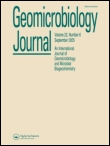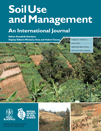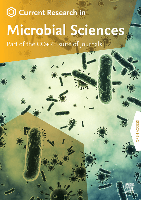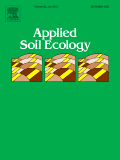
GEOMICROBIOLOGY JOURNAL
Scope & Guideline
Exploring the Interplay of Microbes and Earth
Introduction
Aims and Scopes
- Microbial Biogeochemistry:
Research on how microbial communities influence geochemical processes, including nutrient cycling, mineral weathering, and biomineralization. - Bioremediation Techniques:
Application of microorganisms for the remediation of contaminated environments, particularly in mining, petroleum, and heavy metal pollution contexts. - Microbial Ecology:
Study of microbial diversity and community dynamics in various environments, such as soils, aquatic systems, and extreme habitats. - Geomicrobiological Applications:
Exploration of practical applications of geomicrobiology in agriculture, environmental management, and industry, including biofertilizers and biocementation. - Microbial-Induced Carbonate Precipitation (MICP):
Investigation of MICP processes for soil stabilization, carbon sequestration, and construction applications.
Trending and Emerging
- Microbial Bioremediation of Heavy Metals and Hydrocarbons:
An increasing number of studies focus on the application of microbial communities for the bioremediation of heavy metals and hydrocarbons, reflecting growing environmental concerns. - Soil Microbiome Dynamics:
Research on the influence of soil microbiomes on plant health, nutrient availability, and ecosystem functions is gaining traction, emphasizing the importance of microbial interactions. - Climate Change and Microbial Responses:
Investigations into how climate change affects microbial processes and community structures are emerging, indicating a growing concern for ecological implications. - Microbial-Induced Calcium Carbonate Precipitation (MICP):
The use of MICP for environmental applications, including soil stabilization and carbon capture, is increasingly popular, showcasing innovative uses of geomicrobiology. - Novel Microbial Applications in Biotechnology:
There is a rising interest in exploring the biotechnological applications of microorganisms, particularly in agriculture, waste management, and bioenergy production.
Declining or Waning
- Traditional Biochemical Pathways:
Research centered solely on classical biochemical pathways of microbial metabolism is becoming less frequent as studies increasingly incorporate ecological and environmental contexts. - Single-Microbe Studies:
There is a noticeable decrease in publications focusing on the characterization of individual microbial strains, with a shift towards understanding complex microbial communities and their interactions. - Historical Geomicrobiology:
Research emphasizing historical or paleobiological aspects of geomicrobiology is waning, as current studies prioritize contemporary environmental challenges and microbial responses.
Similar Journals

Soil Ecology Letters
Cultivating Knowledge for Ecological ResilienceSoil Ecology Letters, published by SpringerNature, is a premier journal dedicated to advancing the knowledge and understanding of soil ecosystems, their functions, and their vital role in global sustainability. Since its inception in 2019, this leading journal has consistently maintained its prestigious Q1 ranking in Ecology, Evolution, Behavior and Systematics, as well as Soil Science, reflecting its significant impact in the ecological and environmental sciences community. With an impressive Scopus ranking that places it within the top percentile of journals in its field, Soil Ecology Letters provides a platform for researchers and professionals to disseminate their groundbreaking findings. The journal is a vital resource for advancing research in agricultural and biological sciences, offering open access options that promote widespread dissemination of knowledge. With its focus on fostering collaboration and innovation in soil ecology, this journal is essential reading for anyone aiming to deepen their understanding of soil environments and their critical role in ecological health.

Frontiers in Soil Science
Advancing knowledge for a sustainable future.Frontiers in Soil Science, published by FRONTIERS MEDIA SA in Switzerland, is an esteemed open-access journal dedicated to advancing our understanding of soil systems and their vital role in ecosystem functioning and sustainable agricultural practices. Since its inception in 2021, this journal has quickly established itself within the scientific community, boasting a 2023 Scopus Q2 ranking in Soil Science and a notable percentile of 41 among its peers. Researchers and practitioners in the field will find a wide array of original research, reviews, and contributions that address key topics such as soil health, carbon sequestration, and nutrient cycling. With a commitment to fostering collaboration and dissemination of knowledge, Frontiers in Soil Science serves as a vital resource for professionals, researchers, and students who aspire to innovate and lead in soil science research.

SOIL USE AND MANAGEMENT
Empowering the future of soil use and management.SOIL USE AND MANAGEMENT is a premier academic journal published by Wiley, focusing on the critical domains of Agronomy, Crop Science, Pollution, and Soil Science. With an ISSN of 0266-0032 and an E-ISSN of 1475-2743, the journal has established itself as a vital resource in the field since its inception in 1985. Operating from its U.S. headquarters in Hoboken, NJ, SOIL USE AND MANAGEMENT boasts impressive Q1 rankings across its relevant categories, indicating its standing in the top tier of research journals. Notably, it is ranked 48th out of 406 journals in Agronomy and Crop Science and holds an 88th percentile position, as well as a commendable rank of 26th out of 159 journals in Soil Science, underscoring its influence and reach. This journal serves as an essential platform for researchers, professionals, and students dedicated to sustainable soil management practices and understanding soil's role in agricultural productivity and environmental health. Although it does not offer Open Access, its rigorous peer-review process ensures the publication of high-quality original research, reviews, and case studies critical for advancing knowledge and practice in the field. This journal is crucial for anyone engaged in soil science and its related disciplines, encouraging innovative approaches to challenges facing soil use and management today.

Microorganisms
Transforming research into accessible knowledge.Microorganisms is a leading open-access journal published by MDPI based in Switzerland, catering specifically to the rapidly evolving fields of microbiology and virology. Since its inception in 2013, the journal aims to foster the dissemination of high-quality research through its comprehensive and interdisciplinary platform, with a particular focus on both fundamental and applied microbiological sciences. Contributing to its esteemed reputation, Microorganisms holds a commendable Q2 ranking in the categories of Microbiology and Virology, as well as in Medical Microbiology, highlighting its significance in the academic community. With a consistent impact, evidenced by its rankings in Scopus—such as rank #25 in Virology and #56 in Microbiology—the journal serves as an invaluable resource for researchers, professionals, and students looking to stay at the forefront of microbiological research. As an open-access journal, Microorganisms ensures that vital research findings are readily available to a global audience, promoting collaboration and innovation in the study of microbial life and its implications for health and disease.

ARCHIVES OF MICROBIOLOGY
Fostering Innovation in Microbial ResearchThe Archives of Microbiology, published by Springer, is a reputable journal in the field of microbiology, serving as a vital platform for the dissemination of groundbreaking research and critical reviews since its inception in 1974. With an ISSN of 0302-8933 and an E-ISSN of 1432-072X, this journal operates out of Germany and maintains a global reach, promoting high-quality scholarship across multiple disciplines, including biochemistry, genetics, and molecular biology, as evidenced by its Q2 ranking in Medicine (miscellaneous) and consistent Q3 placements in other categories in 2023. Although the journal does not offer open access options, its rigorous peer-review process ensures that published articles are of the highest standard, making it an essential resource for researchers, professionals, and students keen on advancing their understanding of microbial sciences. As the journal converges toward 2024, it remains committed to fostering innovative microbiological research and facilitating interdisciplinary dialogue within the scientific community.

ANTONIE VAN LEEUWENHOEK INTERNATIONAL JOURNAL OF GENERAL AND MOLECULAR MICROBIOLOGY
Pioneering Insights in Microbiology and Molecular BiologyANTONIE VAN LEEUWENHOEK INTERNATIONAL JOURNAL OF GENERAL AND MOLECULAR MICROBIOLOGY, published by Springer, is a vital resource for advancing research in the fields of microbiology and molecular biology. With its ISSN 0003-6072 and E-ISSN 1572-9699, this journal consistently focuses on cutting-edge studies and developments, providing a platform for the dissemination of knowledge that spans over its rich history from 1934 onwards. The journal holds an impressive reputation, ranked Q2 in Medicine (miscellaneous) and Q3 in both Microbiology and Molecular Biology for 2023, reflecting its significant contribution to the scientific community. Researchers and professionals from various disciplines rely on this journal for quality publications that address complex microbial interactions and molecular mechanisms. Although it currently does not provide open access options, its compelling research remains accessible through institutional subscriptions, allowing it to foster collaborative advancements in the ever-evolving landscape of microbiological sciences.

Current Research in Microbial Sciences
Fostering Excellence in Microbial Science ScholarshipCurrent Research in Microbial Sciences is a distinguished peer-reviewed journal published by Elsevier, focusing on the dynamic and rapidly advancing fields of microbiology and infectious diseases. With an ISSN of 2666-5174, this journal has established itself as an essential resource for researchers, professionals, and students alike, offering the latest findings and insights from 2020 to 2024. The journal holds a significant position in the academic landscape, achieving a Q2 ranking across multiple categories, including Immunology and Microbiology, Infectious Diseases, and Medical Microbiology, demonstrating its impact in these critical areas of study. With impressive Scopus rankings—such as being placed in the 94th percentile for Immunology and Microbiology—current research is well-supported by a thriving scientific community. Although the journal is not open access, it serves as a vital platform for disseminating high-quality research and fostering collaboration within the microbial sciences. Engaging with this journal enables professionals and researchers to stay abreast of innovations and contribute to the collective body of knowledge that shapes our understanding of microbial interactions and infectious diseases.

JOURNAL OF SOILS AND SEDIMENTS
Connecting Soil Science with Global Environmental ChallengesJOURNAL OF SOILS AND SEDIMENTS, published by SPRINGER HEIDELBERG, stands as a premier interdisciplinary platform dedicated to advancing the understanding of soil and sediment dynamics within the broader context of Earth sciences. With an impressive impact factor and a Q1 ranking in both Earth-Surface Processes and Stratigraphy, this journal not only reflects the high quality of research but also contributes significantly to the dialogue amongst researchers, professionals, and students in the field. The journal encompasses a wide spectrum of topics from sedimentology to soil science, making it essential reading for those involved in environmental management, agriculture, and geology. Access options are available to ensure that cutting-edge research is accessible to a global audience, reflecting the journal's commitment to fostering collaboration and innovation. As we converge towards 2024, JOURNAL OF SOILS AND SEDIMENTS aims to continue its role in shaping scientific inquiry and policy formulation concerning the vital roles of soils and sediments in ecological and geological systems.

Forest Ecosystems
Unveiling the secrets of our planet's green lungs.Forest Ecosystems is a prestigious open access journal published by KEAI PUBLISHING LTD, dedicated to advancing knowledge in the fields of forestry, ecology, and conservation. Established in 2014 and located in Beijing, China, this journal has rapidly gained prominence, achieving Q1 status in multiple categories, including Ecology, Evolution, Behavior and Systematics, and Forestry in 2023. With an impressive rank of 19 out of 174 in the Scopus category of Agricultural and Biological Sciences - Forestry, it stands in the 89th percentile, reflecting its influential contributions to the field. The journal fosters scholarly discourse and disseminates innovative research aimed at understanding forest ecosystems and their vital role in our environment. Offering a robust platform for researchers, professionals, and students, Forest Ecosystems ensures accessibility through its open access format, enabling a wider audience to engage with and benefit from cutting-edge research dedicated to the stewardship of forest resources.

APPLIED SOIL ECOLOGY
Bridging Theory and Practice in Soil EcologyApplied Soil Ecology, published by Elsevier, is a premier journal dedicated to advancing the field of soil ecology through rigorous research and innovative methodologies. With an impressive impact factor and a consistent placement in the Q1 quartile across various categories including Agricultural and Biological Sciences, Ecology, and Soil Science, this journal underscores its significance in the scientific community. The journal's scope encompasses critical areas such as soil biology, microbial ecology, and the role of soils in ecosystem services, aiming to foster collaboration and knowledge exchange among researchers, professionals, and students. The convergence of research efforts from 1994 to 2024 highlights its commitment to maintaining current and relevant discourse within the field. While open access options are not available, the quality and depth of the articles published ensure that the latest findings and discussions are accessible through institutional subscriptions. With a strong focus on empirical studies and applied research, Applied Soil Ecology is an essential resource for anyone interested in the complexities of soil ecosystems and their impact on the environment.